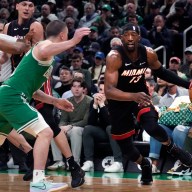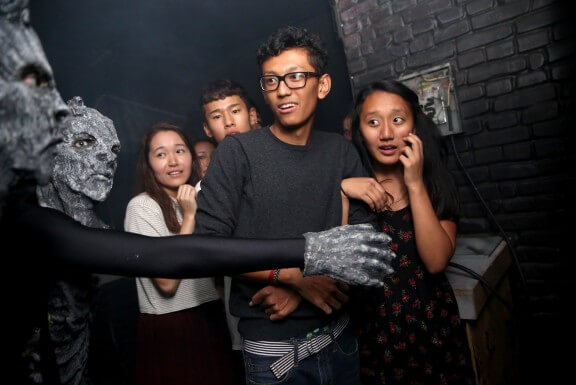 The cameras never stopped rolling when Eric Mangini and Bill Belichick exchanged postgame pleasantries. Credit: Getty Images
The cameras never stopped rolling when Eric Mangini and Bill Belichick exchanged postgame pleasantries. Credit: Getty Images
Let’s talk about manners, media perception, and handshakes. Yes, handshakes, because I’m not sure when it happened, but The Postgame Handshake is most definitely a thing we talk about when we think about the NFL in 2013. FOREWARNING: This could get weird – if you have any Angel Dust, now would be the appropriate time to light up.
First, a review: The Postgame Handshake is a moment shared by opposing NFL coaches after a game. It’s an odd ritual to think about in a literal sense: Imagine spending an entire week scheming against someone, finding holes in their arsenal to exploit, working matchups, and then, win or lose, having to pull a 180, and embrace that person and express gratitude for the opportunity to compete with them. Strange, right?
We’re told sucking it up and tippin’ your cap to the adversary is the RIGHT THING TO DO; part of SPORTSMANSHIP and ACTING LIKE A MAN. I use all caps, because that’s the condescending tone in which these sentiments are expressed in. Only these aren’t two politicians coming together to sign a peace treaty or pass a law. No, we’re talking about two overworked dudes meeting at the 50-yard-line to congratulate one another for a game well played (even if it wasn’t).
Worse, everything about this moment – which, mind you, only lasts between three and eight seconds – is dissected like Miley Cyrus’s MTV VMAs performance. How was each coach’s body language? Did they mean it? What was said? It’s immensely clear that nothing about this is genuine, yet one is typecast as a disingenuous pariah if The Postgame Handshake is not properly executed.
Make no mistake about it: Those four seconds can fuel four hours of sports talk radio.
If this sounds like it hits close to home, well, good. Because Bill Belichick may not be at the center of every postgame handshake controversy, but he certainly is a reoccurring figure. For my money, this nonsense started when he locked Eric Mangini, his former defensive coordinator, out of Gillette Stadium for taking a job to coach the Jets. The media frothed out at the mouth when the Patriots and Jets met the following season. WOULD THE TWO INTERACT? ARE THERE HARD FEELINGS? Then “SpyGate” happened – rinse and repeat. It only got worse when The Hoodie left the field prior to the conclusion of Super Bowl XLII as the Giants spoiled the Patriots perfect season.
I’m not saying Belichick is a saint, and he certainly doesn’t do himself any favors with the media (the most recent example was his denying Steve Tasker, a CBS sideline reporter, a postgame interview after the Patriots fell to the Ravens in the AFC Championship game last season). But none of Belichick’s incidents even come close to rivaling Jim Schwartz hunting down Jim Harbaugh after the 49ers won a regular season game in Detroit two years ago, basically challenging him to a fist fight as the two headed for the exits.
Belichick’s biggest perceived transgression is that he’s lousy at handling losses with grace, which, remember, has nothing to do with his job as a football coach. But his real shortcoming is that he’s not affable – at least not to the media. Moreover, he’s not interesting. Consequently, select writers – both local and national – take time to concoct negative storylines out of the most absurd topics – HANDSHAKES!! — to make him interesting.
So yeah, the media made a huge stink about Belichick blowing Tasker off in last year’s AFC Championship game. Meanwhile, just moments before, here’s what John Harbaugh told Peter King about his conversation with Belichick following the Ravens victory in Foxboro: “I’ll treasure that conversation forever. He was so classy, so gracious. Complimentary about how we played, about our game plan, about how tough it is to play us. I told him how much we pattern our organization around theirs, how much we study them.”
Follow Ryan Hadfield on Twitter @Hadfield__

















